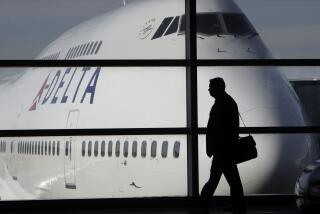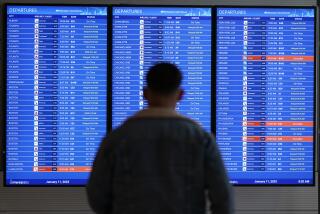Federal Panel Tackles Airline Industry Woes : Transportation: Officially, most of the companies back the effort, but many also believe they should be left alone.
NEW YORK — The embattled U.S. airline industry, beset by huge losses and deeply divided over foreign investment, bankruptcy laws and access to international skies, is the subject this week of a federal study designed to help it out of its troubles.
A bipartisan, 15-member federal commission begins its first all-day session in Washington today as the industry struggles to pull itself out of financial troubles that have sparked losses of more than $10 billion in the last three years.
The panel, appointed by Congress and the White House, has 90 days in which to issue its recommendations.
Most industry leaders officially say they support the panel’s efforts, but some also believe the airlines should be left alone to solve their own problems.
“I’m worried the commission will make a lot of mistakes because it does not understand the business,” said Robert Crandall, chief of American Airlines, the nation’s largest carrier.
Although most U.S. airlines continued to lose money in the first quarter of 1993, the industry is expected to return to profit later this year after reducing its fleets, raising its fares and seeing passengers return to the air after a recession-driven hiatus.
U.S. airlines are nonetheless deeply divided over key issues to be tackled by the panel, including foreign investment, international air pacts and bankruptcy laws.
The three largest U.S. carriers, American, United Airlines and Delta Air Lines, have called for liberal international pacts to give them more access to overseas passengers.
Without such access, they are vehemently opposed to overseas airlines buying in to their competitors.
The Big Three, for example, fiercely fought British Airways’ recent $300-million investment in USAir, contending it would give the huge British carrier access to the U.S. market while their access abroad remains limited.
The largest airlines have also assailed U.S. laws that permit bankrupt carriers to continue operating and at the same time offer low fares to lure passengers.
More to Read
Inside the business of entertainment
The Wide Shot brings you news, analysis and insights on everything from streaming wars to production — and what it all means for the future.
You may occasionally receive promotional content from the Los Angeles Times.










